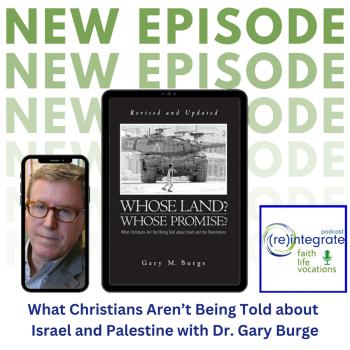 Very often, evangelicals confidently point to a certain passage to define the gospel.
Very often, evangelicals confidently point to a certain passage to define the gospel.
They point to 1 Corinthians 15:1-8, saying that this one passage tells us what the gospel is.
According to most evangelicals, the “gospel” that Paul had preached to the Corinthians and now wants to remind them of, the gospel by which we are saved, the message that he received and passed on to them as of first importance can be summarized in the next few verses (verses 3 through 7).
“that Christ died for our sins according to the Scriptures, that he was buried, that he was raised on the third day according to the Scriptures, and that he appeared to Cephas, and then to the Twelve. After that, he appeared to more than five hundred of the brothers and sisters at the same time, most of whom are still living, though some have fallen asleep. Then he appeared to James, then to all the apostles, and last of all he appeared to me also, as to one abnormally born.”
That, according to many, is the gospel.
Certainly, that is the great story of Jesus’s death and resurrection, which is true and important and foundational to understanding who Jesus is and has accomplished. But the question I have is this: Are these events, in and of themselves, “good news?” Is this really “the gospel” (evangelion in Greek)?
At this point, most evangelicals will begin to extrapolate from the text why this is good news. They’ll talk about how this is good news because Christ’s death forgives our sins. They’ll talk about how it is good news because Jesus defeated death. Yes and yes!
They’ll also talk about how this is good news because Christ died in our place as the atoning sacrifice for our sins (notice that this is not in the text), and they’ll go on to say that it proves how much God loves us because Christ laid down his life for us (notice that this is also not in the text), and it is good news for us because when we believe in the death and resurrection of Jesus, we are given eternal life (again, not in the text).
These are all true things, and I’m not denying them!
My question is this: What is the “good news” in the text of 1 Corinthians 15?
What 1 Corinthians 15 Says the Gospel is
Here, quite simply, is what is being missed by us when we seek to define the gospel merely by the few words of 1 Corinthians 15:1-8:
The meaning of “gospel” or “good news” (Greek evangelion).
This is a technical term in the time of Paul and the Corinthians. This word was used in the Roman world for the birthday of the emperor. Every year in the Roman world, there was a celebration of the Caesar’s birthday because it was the “the evangelion to the whole world.” The Roman Empire proclaimed the “good news” that the king (Caesar) reigned over the known world. So, when we see this word in the New Testament, what we have is a subversive message concerning kingdom and the one true King.
The gospel that Jesus proclaimed in the Gospels was this:
“I must proclaim the good news of the kingdom of God to the other towns also, because that is why I was sent.” (Luke 4:43).
The apostle Paul, in another letter, made it clear that in order to be “saved,” you must “declare with your mouth, ‘Jesus is Lord,’ and believe in your heart that God raised him from the dead” (Romans 10:9-10).
The “good news” or “gospel,” therefore, is that Jesus is Lord.
The meaning of “Christ.”
Again, this is a technical title for Jesus. “Christ” is the Greek translation of the Hebrew word “Messiah,” which literally means “the anointed one.” The King is the primary anointed one in the Old Testament, so when Jesus is called “Christ” in the New Testament, what the writer is proclaiming is the gospel: Jesus is the Lord. Every time the New Testament says “Jesus Christ” or “Christ Jesus,” the gospel is proclaimed. We miss this in our 21st Century evangelicalism, where “Christ” has merely become Jesus’s last name. N.T. Wright’s version of the New Testament retranslates “Christ” literally so that we are struck with the gospel every time we read it: “King Jesus” or “Jesus the King.” Because that is what he is and that is what the gospel is. Jesus is the Christ, the Messiah. Jesus is Lord.
The larger context of 1 Corinthians 15.
It is shocking how often we evangelicals do not follow our own rules for interpreting Scripture, one of which is to look at the entire context of a passage so that we can rightly understand what is being said. As my New Testament professor at Trinity, D.A. Carson, used to tell us, “A text without its context is a pretext for a prooftext.” So, let’s look at the entire context of 1 Corinthians 15 in order to define the “gospel.”
The apostle Paul is notorious for taking tangents before circling back to his main point. And this is what he does here. The resurrection becomes the tangent, because of how important the resurrection is and because some of the Corinthians not only had trouble believing Jesus rose from the dead but they didn’t even believe that anyone could possibly raise from the dead.
But as Paul makes the case for resurrection, in verses 24-28, he circles back to his original point about the “gospel.” He says that after the resurrection of Jesus, we all too will resurrect. And then the gospel will become true in its fullness, because Jesus will indeed be Lord over everything.
“Then the end will come, when he hands over the kingdom to God the Father after he has destroyed all dominion, authority and power. For he must reign until he has put all his enemies under his feet. The last enemy to be destroyed is death. For he ‘has put everything under his feet.’ Now when it says that ‘everything’ has been put under him, it is clear that this does not include God himself, who put everything under Christ. When he has done this, then the Son himself will be made subject to him who put everything under him, so that God may be all in all.” (1 Corinthians 15:24-28)
There it is: The gospel is the good news of the kingdom of God, i.e., that Jesus is Lord, for “he must reign until he has put all his enemies under his feet” and the resurrection of Jesus’s followers will destroy “the last enemy,” death. Then, the Son will submit himself to the Father, who will be made “all in all.”
My friend (and mentor – he was one of my New Testament professors in seminary), Scot McKnight, writes,
“The story of Jesus continued beyond the appearances, and many (I’m one of them) judge it likely that the ‘gospel’ Paul received and Paul preached and the Corinthians received did not end in paragraph B (at 15:5), but continued to the end of all ends in paragraph C (vv. 20-28). In other words, there are reasons to think the gospel of Paul included the ascension of Jesus, the second coming of Christ, and the full consummation of the kingdom when God becomes all in all.” (The King Jesus Gospel: The Original Good News Revisited, Zondervan, 2011)













